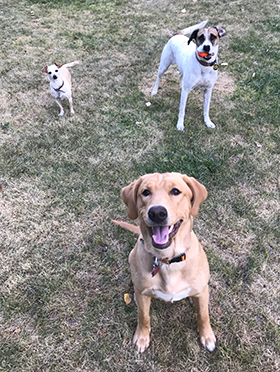
Jack, Lucy and JJ

Photo by Dr. Dawn McDonald
Jack, Lucy and JJ started off the summer with severe upper-respiratory infections. JJ ended up with pneumonia. All are well today, but dogs in their part of Montana continue to fall ill.
A potentially lethal and highly contagious upper-respiratory infection is sickening dogs by the hundreds across the Gallatin Valley in Montana, veterinarians in the area report.
Since mid-June, dogs have been coming down with a cough that in some instances has progressed in a matter of two or three days to life-threatening pneumonia.
"There's not a day that goes by that we don't see a new coughing-dog case at every single one of my hospitals," said Dr. Jarrod Moss, who owns three in the region.
So far, no one knows what pathogen is behind the illnesses. Moss suspects influenza, but that's unconfirmed. Another veterinarian reported that laboratory results from 10 to 12 sick dogs seen by her practice have tested negative for influenza.
"Everything we've gotten through testing, we have not gotten a substantial number that have tested [positive] for the same organism," said Dr. Dawn McDonald. "There is very little overlap in the organisms they are finding."
McDonald, an associate at 360 Pet Medical in Bozeman, has had a close-up view on the situation. Her three dogs were among the earliest cases. Jack, a 9-month-old Labrador/flat-coated retriever, was the first to begin coughing, about seven days after a visit to doggy day care. JJ, an 8-year-old large mixed-breed dog, and Lucy, a 7-year-old Chihuahua, then became sick, although they hadn't been to day care.
JJ's cough became pneumonia in four days. Within 48 hours on the antibiotic Clavamox, she began to recover. All three dogs were coughing for about 10 days, McDonald said: "It was pretty awful."
Laboratory tests showed Jack positive for mycoplasma, a type of bacteria that can cause nasty respiratory diseases, while JJ and Lucy were negative, McDonald said.
Other sick dogs seen in McDonald's clinic have come up positive — through PCR or culture tests — for a grab bag of pathogens: coronavirus, Streptococcus equi, pneumovirus, beta hemolytic Streptococcus, Pasteurella, E. coli and Staphylococcus schleiferi, she reported.
"But also, more than eight have tested negative for everything," McDonald added.
Another notable feature of the illness is that youth and vigor seem to offer no protection. "It’s not just attacking older ill dogs," McDonald said. One patient seen in her practice who died was only two years old and previously healthy. She said she's heard of five dogs total who have died to date.
Like Moss, who owns Creekside Veterinary Hospital, McDonald said the clinic where she works continues to see new cases regularly, at the rate of five or six a day. Both veterinarians said all dozen or so clinics in the valley have had cases.
"Bozeman is a very social place as far as dogs go," McDonald said. "Dogs go everywhere: day care, kenneling, dog parks, the trails. It's not surprising it's caught the way it has."
Moreover, Bozeman, located near Yellowstone National Park, is a popular summertime tourist destination. Visitors often bring their dogs. That amplifies the potential for the illness to spread beyond the region.
So contagious is the infection that Moss was only half joking when he said, "Our advice is to board up your windows and never leave your house."
Short of that, he advises people in the area to avoid taking dogs to kennels, groomers', dog parks and other places dogs congregate. He also recommends making sure dogs are up-to-date on vaccinations against respiratory diseases, including influenza, parainfluenza and Bordetella.
Aggravating matters, Bozeman's air is heavy with pollution from wildfires, "so animals who already are having respiratory problems from some virus are now having to breathe smoke-infested air," Moss lamented. "We're seriously recommending they stay inside and humidify the air."
In Moss's experience, five to 10 percent of cough cases have progressed to pneumonia. He advises anyone whose dog begins coughing to take it to a veterinarian right away.
"We're seeing … that two to three days after dogs present for coughing with what we think is just bronchitis, they're coming back with fevers, they're dehydrated, not drinking, not eating, and X-rays show they have pneumonia," Moss said.
Those patients are admitted to the hospital, given nebulizing treatments to open their airways, and provided with intravenous fluids and antibiotics.
"We're treating these as aggressively as I've ever treated any pneumonia," he said. "These … are very sick dogs."